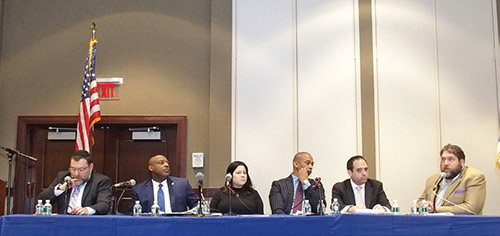

How do we stand up to anti-Semitism and hate? A panel discussion at Congregation Ahavath Torah in Englewood on Feb. 9 came to one general conclusion: It takes the combined efforts of individuals, legislators, law enforcement and educators working together.
Rabbi Chaim Poupko, senior rabbi, noted that as long as humans are different, there will always be hate to reckon with. But the Ethics of the Fathers teaches that although we are not obligated to complete the work of eradicating hate, we are obligated to keep trying. It takes a twofold approach: Bring together people from different communities to get to know and understand each other, and form alliances to work together in order to call out and take down the haters who are bent on harming us. Moderator Liel Leiboviz, a senior writer at Tablet, an online magazine, and professor of communications at New York University, mused that what is somewhat different about anti-Semitism now, as opposed to other eras in history, is that it is being perpetrated by varied groups like white supremacists and college professors, who have conflicting ideas of who Jews are: all powerful controllers of institutions and a defenseless people; superhuman and not human at all.
Michael Cohen, eastern director of the Simon Wiesenthal Center and Englewood City Councilor in the second ward, has been on the front lines of fighting some of the most visible outbreaks of anti-Semitism. He talked about going to Mahwah’s city council meetings about a proposed eruv in the town, which prompted town residents to use hate-filled vitriol in their objections, and more recently, working to persuade Facebook to take down the group Rise Up Ocean County, founded to keep Jews out of towns bordering Lakewood. And he credited two of the other panelists, Bergen County Sherriff Anthony Cureton and New York Assemblyman Walter Mosley, with their advocacy and assistance in the fight against anti-Semitism.
Assemblyman Mosely, who is African-American, talked about his personal striving to “live not just in the image but the spirit of God” by walking quietly, “carrying a big stick” a la Theodore Roosevelt, and doing the right thing, even when no one is looking. He emphasized the need for communities to work together, recalling that Dr. Martin Luther King Jr. said the victories achieved by African Americans were made possible by “those who stood with us of the Jewish faith.” Mosely co-sponsored anti-BDS legislation in the Senate, causing him to lose a high-ranking position, he said, and last week introduced a bill requiring an administrator on every college campus to be trained in recognizing and stopping harassment, an increasing phenomenon facing Jewish college students.
Sheriff Cureton also recalled how the African-American and Jewish communities worked together in the past and should be doing so again now. As he told me in a discussion before the program started, “We should be riding on the same train.” Cureton got a first-hand look at virulent anti-Semitism when he volunteered to attend a meeting in Mahwah, representing the Bergen County NAACP. “I felt so much hate, I had to be escorted out of chambers by law enforcement,” he said. Cureton is working to protect Bergen County residents by getting to know the different communities—what offends them and what is important to them. And while all the panelists talked about how social media is contributing to extremist views becoming mainstream and polarizing, Cureton has also found that social media can be a law enforcement tool, leading the police to criminals. “People talk too much. We have (social media) pages to watch. At some point people compromise themselves. They finally act and are bound to tell.”
Another speaker, Sarri Singer, was a victim of hate—she survived a 2003 bus bombing in Israel—but is channeling the pain by helping terror victims from around the world to heal through an organization she founded, Strength to Strength. “We’re teaching young people not to hate—and to empower them to be active leaders to stop hate,” she said. The daughter of a New Jersey state senator, she said that although she was not interested in politics when she was younger, growing up in politics gave her the skills to help with her work now.
While waiting for the program to start, I asked a man sitting behind me why he came to the program. He said he and his wife came because they felt it is important; that there is so much hate in society and they wanted to understand more. And they wanted to see others who also find this important. “You can’t always sit back in your living room,” he said.
By Bracha Schwartz













